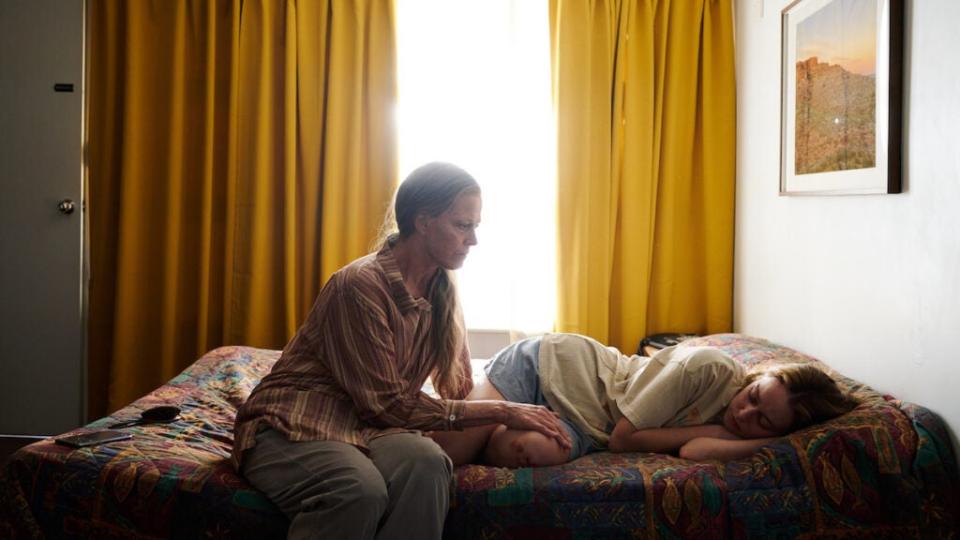‘The Lost Flowers of Alice Hart’ Review: Sigourney Weaver Holds Acting Master Class in Thorny Limited Series
Sigourney Weaver reminds us of her unfailing instincts as an actor about halfway through “The Lost Flowers of Alice Hart,” the coiled, atmosphere-rich limited series based on Holly Ringland’s bestselling novel.
Weaver plays June, battle-hardened matriarch of a wild flower farm in Australia that doubles as a refuge for battered women. She’s also a master manipulator and control freak, and when her partner, Twig (Leah Purcell), discovers a particularly nasty deception, Twig takes an ax and goes to work on a tree that means a lot to both women. With each resonant “thwack,” June cringes, buckles and winces, a look of soul-deep pain written across her face. For these few moments, she is the human embodiment of that tree.
It’s easy to take Weaver for granted; she doesn’t work much anymore outside of the “Avatar” franchise, and to a certain segment of viewers she will always be badass Ripley from the “Alien” movies. But when she commits, as she does in “Alice Hart” (for which she was also an executive producer), there is no one better. Weaver is the emotional anchor of this series about trauma, memory, family and forgiveness — a thorny drama that crawls under your skin even as it struggles to stick a landing that does justice to what has been steadily built over seven tense hours. Immersive and often entrancing, “Alice Hart” is made for bingeing, though Prime Video has chosen to dole it out over a five-week period.
Each episode begins with a trigger warning alerting the viewer to content related to domestic violence, a subject “Alice Hart” understands with almost eerie acuteness. We first meet the title character as a child, daughter to Agnes (Tilda Cobham-Hervey) and Clem (Charlie Vickers), the latter a master of the abuser’s charm-and-destroy ways. One minute he’s good ol’ laughing dad and husband, the next he’s using his fists. Later in life, the young adult Alice (Alycia Debnam-Carey) falls in love with a seemingly sensitive park ranger (Sebastián Zurita) who fits the profile even better, mixing in bouts of sobbing and remorseful self-flagellation with his beatings.
“Alice Hart” has an innate understanding of how abusers keep their victims off balance. The series also suggests that we tend to marry our parents, whether we like and/or know it or not.
June doesn’t just run her sprawling flower farm; she is also a floriologist, which means what it sounds like: she speaks a secret language of flowers, which series creator Sarah Lambert cannily brings to visual life. “The Lost Flowers of Alice Hart” is wise to various means of alternative communication, whether that means arranging a floral pattern that means something very specific, or circling words in a book to smuggle illicit plans. Of course there’s also the usual barrage of text messages and voicemails, all of which seem somewhat crude compared to the coded languages on display.

“Alice Hart” revolves around the keeping and revealing of secrets, their corrosive power and the ways in which we convince ourselves of their necessity. June is a particularly adept rationalizer in this regard; her good works lead her to believe the ends always justify the means.
Shot in New South Wales and the Northern Territory, the series takes full advantage of the natural beauty that flows from its settings, with wide vistas and a sense of perpetual dusk accentuating the drama. These are cosmic, otherworldly surroundings against which the principals enact their outsized dramas. Hania Rani’s trembling, string-heavy score adds to the foreboding, as do the additional music selections; you’ll never hear Phoebe Bridgers’ cover of Metallica’s “Nothing Else Matters” put to more haunting effect. The series has a thick vibe that invites you in but warns you to proceed with caution. This is a rich evocation of trauma, given poetic visual form.
It’s also a reminder that there’s a whole lot of acting talent down under. The standouts here include Debnam-Carey, pushed to emotional extremes as Alice comes to grips with her past; Purcell as Twig, June’s patient partner who comes to know too many of her tricks; and Asher Keddie as Sally, an emissary from life outside the farm and, in her own way, a keeper of Alice’s secrets. This is a mighty ensemble, and they get every opportunity to shine in a story fueled by the push-pull of conflict and quiet betrayal.
But this is ultimately Weaver’s show, and her feat here goes way beyond pulling off an Australian accent. She has fleshed out a character of near-Shakespearean complexity and violent moral ambivalence – caring but deceitful, strong but deeply wounded, nurturing but damaging, proud but plagued by doubt. June rules a kingdom that she has created in her own image, an ostensibly safe place where she happens to be the most dangerous snake in the garden. The more she cares, the more potent the venom. She’s a protector who also knows how to smother, all for the sake of keeping the outside world at bay.
“The Lost Flowers of Alice Hart” premieres Friday, Aug. 4, on Prime Video.
The post ‘The Lost Flowers of Alice Hart’ Review: Sigourney Weaver Holds Acting Master Class in Thorny Limited Series appeared first on TheWrap.
